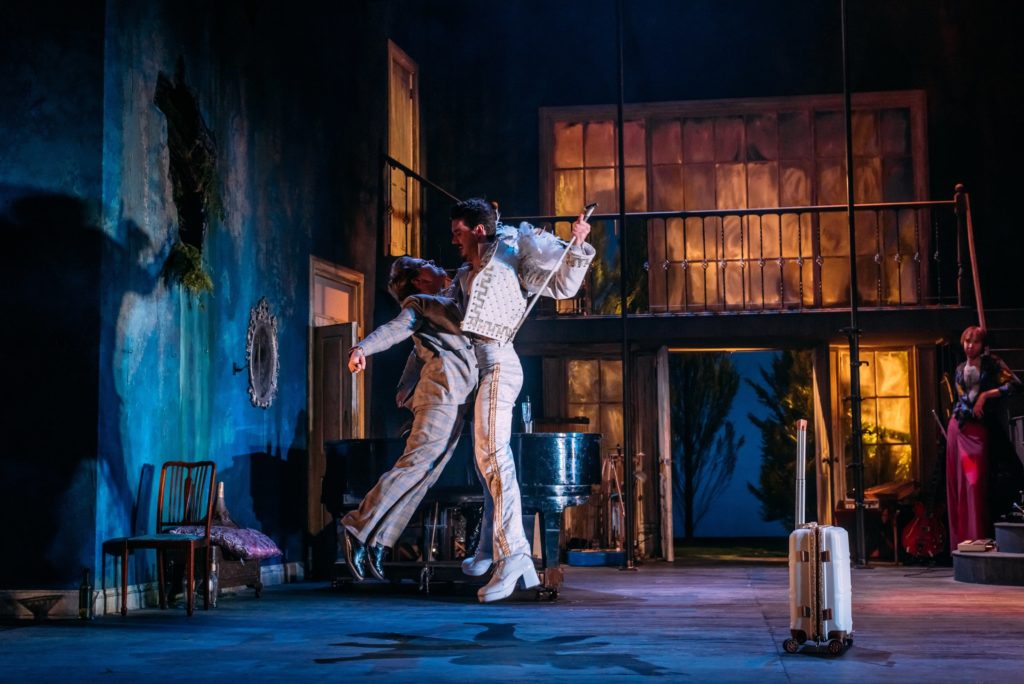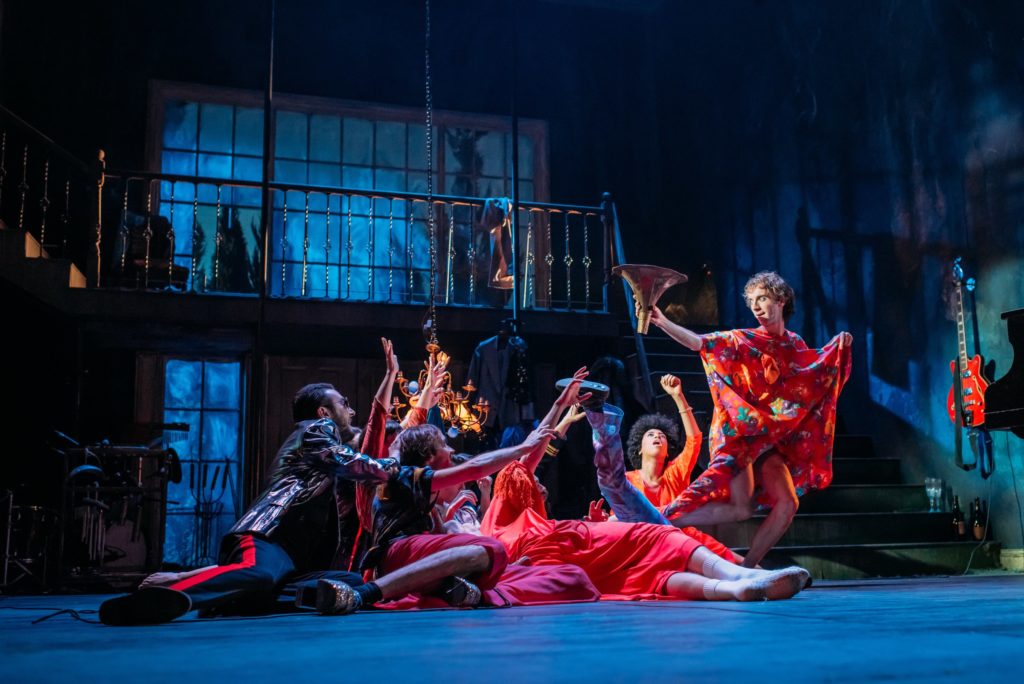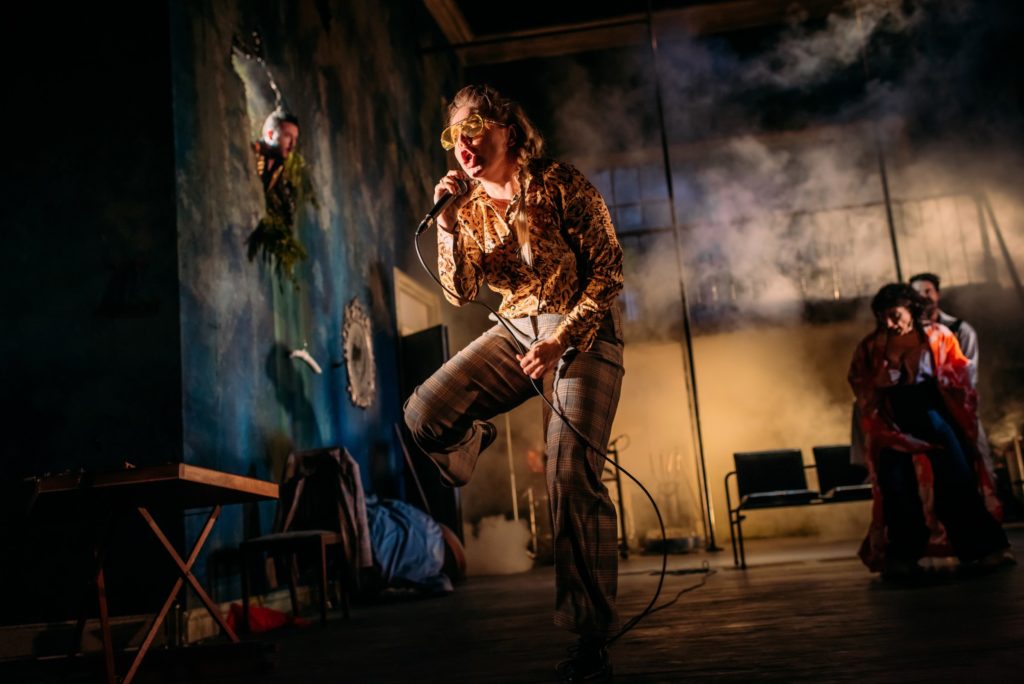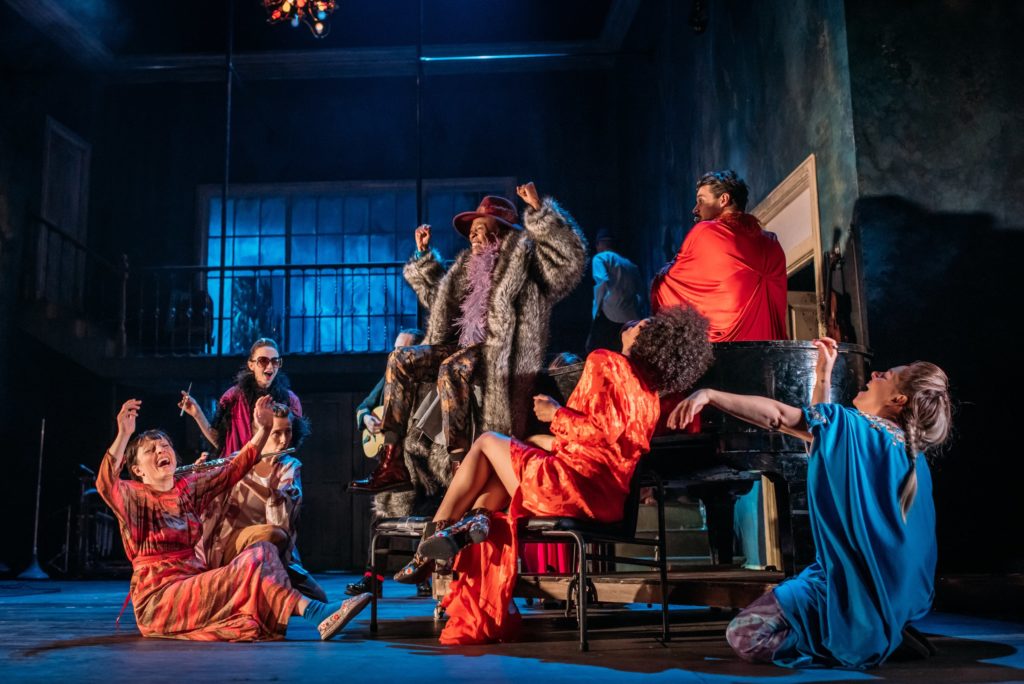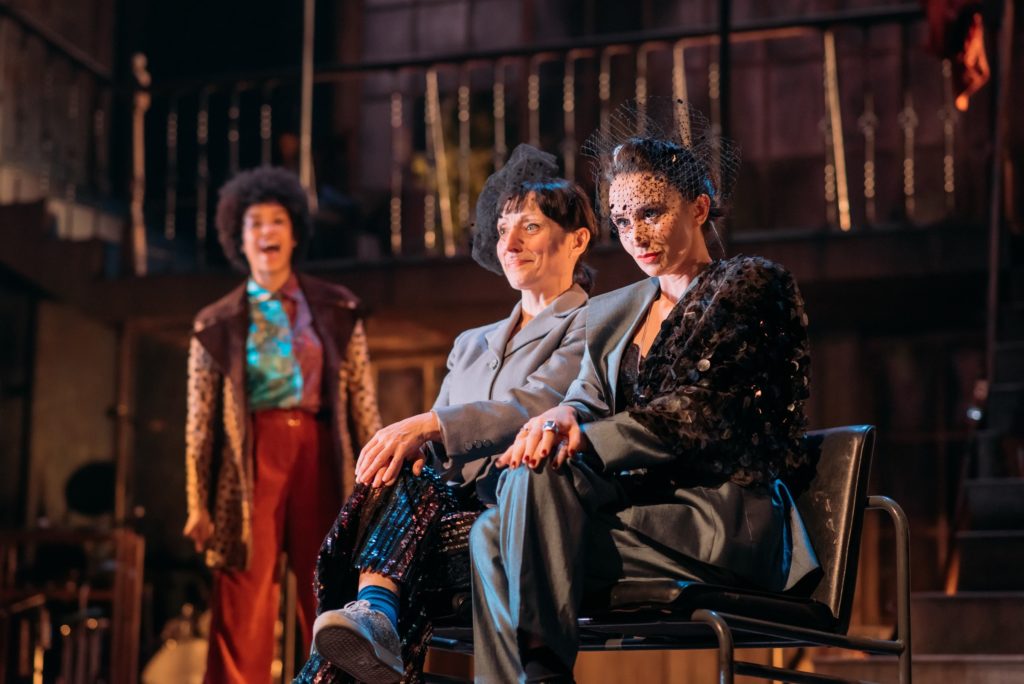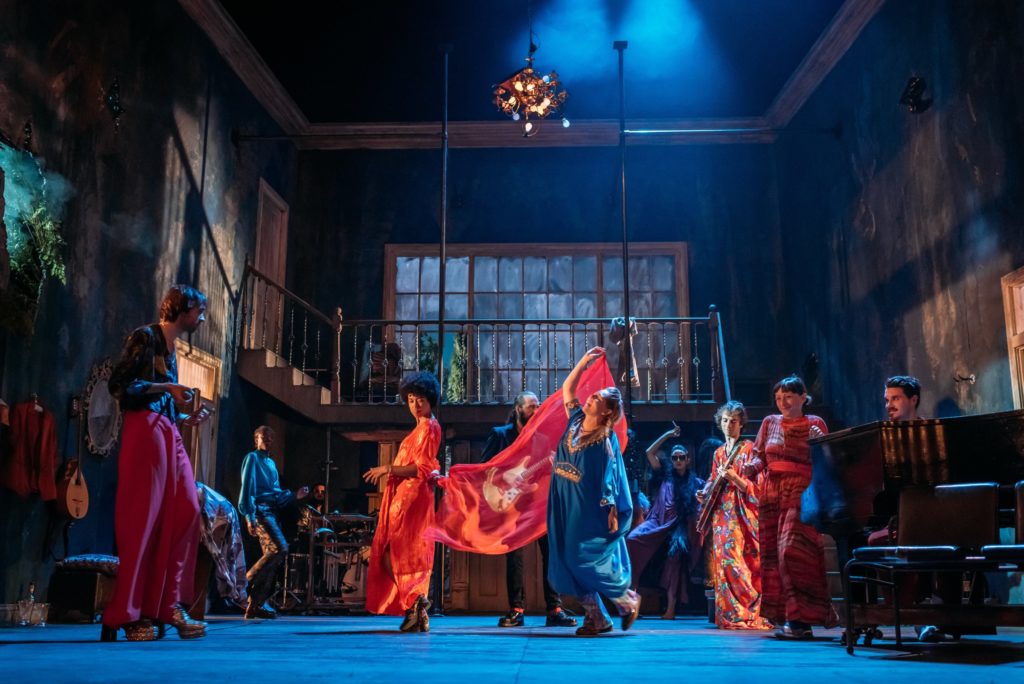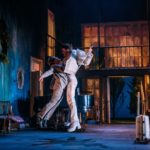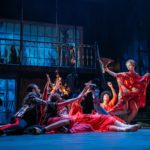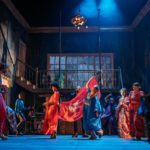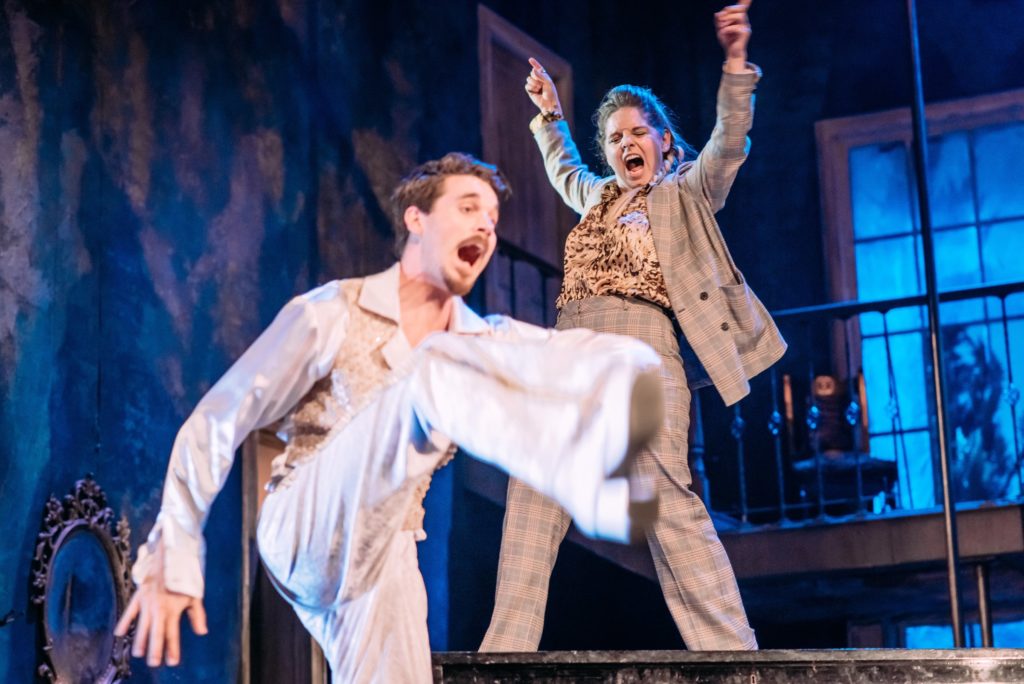
Twelfth Night
Gender-bending, gloriously psychedelic, and deeply, madly groovy.
This is a riot of music and colour carried off by a stellar cast, bringing this complex story to life with an energy and flair that is jaw-dropping, and includes the most show-stopping second half opener I have seen in years.
The action opens in a debauched 60s / 70s house party that has been going on for days, and the tone of playfulness and outrageously costumed gender mixing moves on swiftly from there, with the rich language of Shakespeare brought to life with effortless and astonishing panache, and musical performances that would not be out of place in The Rocky Horror Picture Show.
If music be the food of love, play on...
Music is, very rightly, at the core of this show, and the inventiveness and skill in the vocal and instrumental performances is matched by the spectacular costumes and fluent staging. There's not a single thing not to love here, and the joy and playfulness of Shakespeare's work is placed effortlessly into the psychedelic vibe of the late 60s / early 1970s. We're channelling early Bowie, Doors, and Marc Bolan, with flashes that occasionally seem more like Freddie Mercury or Elton John at their showman best.
This is the Summer of Love - revisited and remixed - and the intricate story of how the cross-dressing Viola, disguised as Cesario, woos Duke Orsino, and at the same time manages to hook up her lost brother Sebastian with Countess Olivia is deftly unwrapped by a cast that is confident, competent and classy.
She's not sure if you're a boy or a girl...
And of course, you're not always quite sure if you're watching a boy or a girl. Genders are purposely messed around with, with traditionally male role of Orsino played by Colette Dalal Tchantcho, and the magnificently named character of Sir Toby Belch becomes Lady Tobi, played with roistering panache by Dawn Sievewright. Sebastian is, of course, a girl: Joanne Thomson. And many of the characters are androgynous, flounce around in gloriously coloured diaphonous dresses, and their singing is as often falsetto as any other register.
Yet two of the most remarkable performances are male, and Malvolio's entrance, costume, and musical start to the second half of the evening is truly show-stopping. The transformation from the repressed, pompous character played by Christopher Green into a strutting, camp peacock is just remarkable. And the foppish, foolish, very hesitant and yet deeply endearing character of Andrew Aguecheek is pitch-perfect throughout from Guy Hughes - and his surprise appearance after a piano solo, suddenly ripping into a saxophone riff, delighted the very appreciative audience.
But this is not to take anything away from remarkable 'straight' female performances by Lisa Dwyer Hogg as Olivia and Joanna Holden playing her general factotum, Maria. The revelation and tells signalling how Olivia is being smitten by Cesario are subtly, but clearly signposted for the audience, and her dialogue with him/her sparkles. The pivotal role of Maria is played with mischievous flair, and her conspiracy with Lady Tobi and Andrew Aguecheek to humiliate Malvolio is deft and delightful. But Jade Ogugua as Viola, the central character, also has to be remarked on: her diction and delivery as she moved from female to male persona was spot on, and her performance was gently understated, but still commanding.
The more minor roles are no less accomplished, with Aly Macrae (who also happens to be the Musical Director) a convincing Captain, and also a dead ringer for a hippy priest, and Brian James O'Sullivan playing Antonio and Valentine with spirit and musical aplomb. Dylan Read plays the jester Feste with real style and swagger, and the gentle ping every time he earns a penny for his songs or services is a delightful touch.
Juicy, inspired and astounding
It has to be acknowledged: the casting is inspired in every way, and the singing and music-making abilities of the cast were just as remarkable as their 'theatrical' performances. Director Wes Wilson can take a bow for melding together this rapturous musical spectacle and still rendering Shakespeare's timeless poetry faithfully. The choreography and stagecraft is delightful: the way the action moves around the stage and the cast fluidly manipulate a grand piano, appear from holes under the stairs or enter or exit through the walls, doors or windows is slick and fluid, and the lighting is psychedelic or slap-bang-wallop cabaret when needed, and subtle and unobtrusive when not. And the sound is just amazing - with Meilyr Jones providing some astounding vocal performances, and some distinctly odd but funky-sounding instruments coming into play.
And of course, we have the big juicy issue of gender - and desire - at the heart of it all. The four main characters are all played by girls. Sir Toby has become Lady Tobi, but she still flirts and cuddles with Maria. Maria brazenly tricks Aguecheek into squeezing her breasts within moments of meeting him. The jester wears dresses. The steward declares his love by strutting around in a fluorescent yellow bodysuit wearing a sparkling codpiece the size of, well, a big cod. And we are probably all aware that Shakespeare was writing for an all-male cast. And there's the issue of colour, too: of two twins, one's black and the other white. Gender is critical, and yet fluid. Assumptions and 'normal' behaviour are out of the door. This is a party and a charade, but with a serious edge under the surface.
And of course, don't forget the soundtrack: if ever there was a stage play where you left and immediately wanted to listen to the playlist, this is it.
In conclusion: Twelfth Night at the Lyceum is the most joyful, colourful and beautiful looking and sounding performance of Shakespeare I have seen, and the hoots and cheers from the full house at the Lyceum showed that it was also one of the most successful.
If you hate Shakespeare, come and see this, and be amazed. If you love Shakespeare, come and see this, and be amazed. If you are indifferent to Shakespeare, come and see this, and be amazed.
★★★★★ 5 stars
14 September - 6 October 2018, 7:30pm Tuesdays - Saturdays
MATINEES from 19 September, 2pm ,Wednesdays and Saturdays
Running time: Approximately 3 hours, including one 20 minute interval

